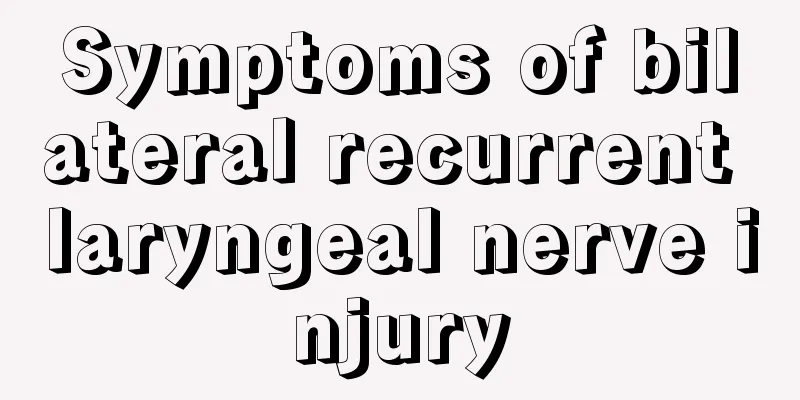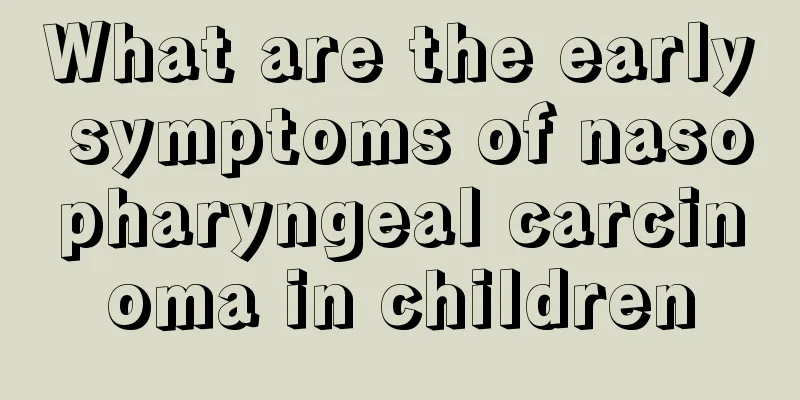Symptoms of bilateral recurrent laryngeal nerve injury

|
Bilateral recurrent laryngeal nerve injury is a post-operative complication, which usually manifests as hoarseness and loss of voice. In severe cases, it can cause symptoms such as difficulty breathing and even suffocation, which is very harmful to patients. Bilateral recurrent laryngeal nerve injury with mild symptoms can recover to normal within a period of time after surgery, but this complication that can be discovered immediately after surgery must be treated immediately to prevent it from developing into serious symptoms. Symptoms of bilateral recurrent laryngeal nerve injury 1. Hoarseness: It is the main symptom of recurrent laryngeal nerve damage. Unilateral injury to the entire branch or anterior branch of the recurrent laryngeal nerve often causes hoarseness, which can seriously affect the patient's work and life, especially for patients working in professions such as teachers and actors. Unilateral injury to the posterior branch of the recurrent laryngeal nerve may not cause obvious symptoms in terms of breathing and pronunciation. 2. Aphonia: Aphonia is often caused by damage to the entire branch and anterior branch of the bilateral recurrent laryngeal nerve. 3. Coughing when drinking water: often accompanied by hoarseness, it is a common symptom of recurrent laryngeal nerve damage. The pathogenesis is mainly caused by incomplete closure of the glottis during swallowing, resulting in liquid leakage into the trachea. 4. Dyspnea or suffocation: The posterior branches of the bilateral recurrent laryngeal nerves are damaged, and the patient's ventilation function is severely impaired, which may cause dyspnea or even suffocation. 5. Others: Temporary paralysis of the recurrent laryngeal nerve is mostly caused by edema, hematoma or scar compression, and usually recovers on its own within 3 to 6 months. Those with very minor injuries can recover within 1 to 2 weeks after surgery. Patients with permanent damage to the recurrent laryngeal nerve on one side often recover gradually through compensation by the contralateral recurrent laryngeal nerve. Treatment of bilateral recurrent laryngeal nerve injury If symptoms of recurrent laryngeal nerve injury occur during surgery, they should be treated immediately, including removing suspicious knots, loosening suspicious sutures, and immediately exposing the recurrent laryngeal nerve on the affected side. If a nerve is found to be severed, it should be sutured immediately. Use appropriate neurotrophic drugs postoperatively. Can bilateral recurrent laryngeal nerve injury be cured? Recurrent laryngeal nerve injury is one of the common serious complications of thyroid, parathyroid or neck surgery. When symptoms of recurrent laryngeal nerve injury appear after surgery, the traditional view is that the patient should be observed for 3 to 6 months before considering surgical exploration. It is generally believed that the time for re-exploration of unilateral recurrent laryngeal nerve injury should not be later than 4 to 5 months after the first surgery. When bilateral recurrent laryngeal nerves are injured, due to breathing difficulties and loss of voice, in addition to timely tracheotomy, early surgical exploration should be performed. If necessary, arytenoid resection or vocal cord fixation can be performed to expand the glottis. |
<<: Can kidney damage recover on its own?
Recommend
What are the symptoms of radiation enteritis?
The symptoms of radiation enteritis are actually ...
What are the late symptoms of bone cancer
In the late stage of bone cancer, systemic sympto...
There are so many neck massage techniques
Cervical spondylosis is a common disease among ma...
Rectal sequelae of uterine cancer radiotherapy
Endometrial cancer is a malignant tumor that grow...
How to remove stains from children's clothes
Babies are often active because they are curious ...
Find out the 6 pain-relieving "keys" hidden in your body
The key to relieving headaches - rubbing between t...
The dangers of secondary orthodontic treatment
In our lives, many people feel that their teeth a...
The pros and cons of drinking rose water for a long time
In addition to being given as gifts and used as d...
Tips for practicing Dantian for singing
Everyone likes to learn to sing, but they will fi...
What are the factors that lead to the occurrence of cervical cancer?
Cervical cancer is a very common disease in life....
What are the treatments for eczema?
Many people have suffered from eczema in their da...
The place where the rabies vaccine was given is red and swollen
In daily life, if you are bitten or scratched by ...
The white stuff in the fish's belly
Many friends still like fish, so they often buy f...
Is it okay to have fragrance in skin care products?
There are many types of skin care products with m...
Are boys or girls more common in pregnancy?
Many women want to know whether they are carrying...









